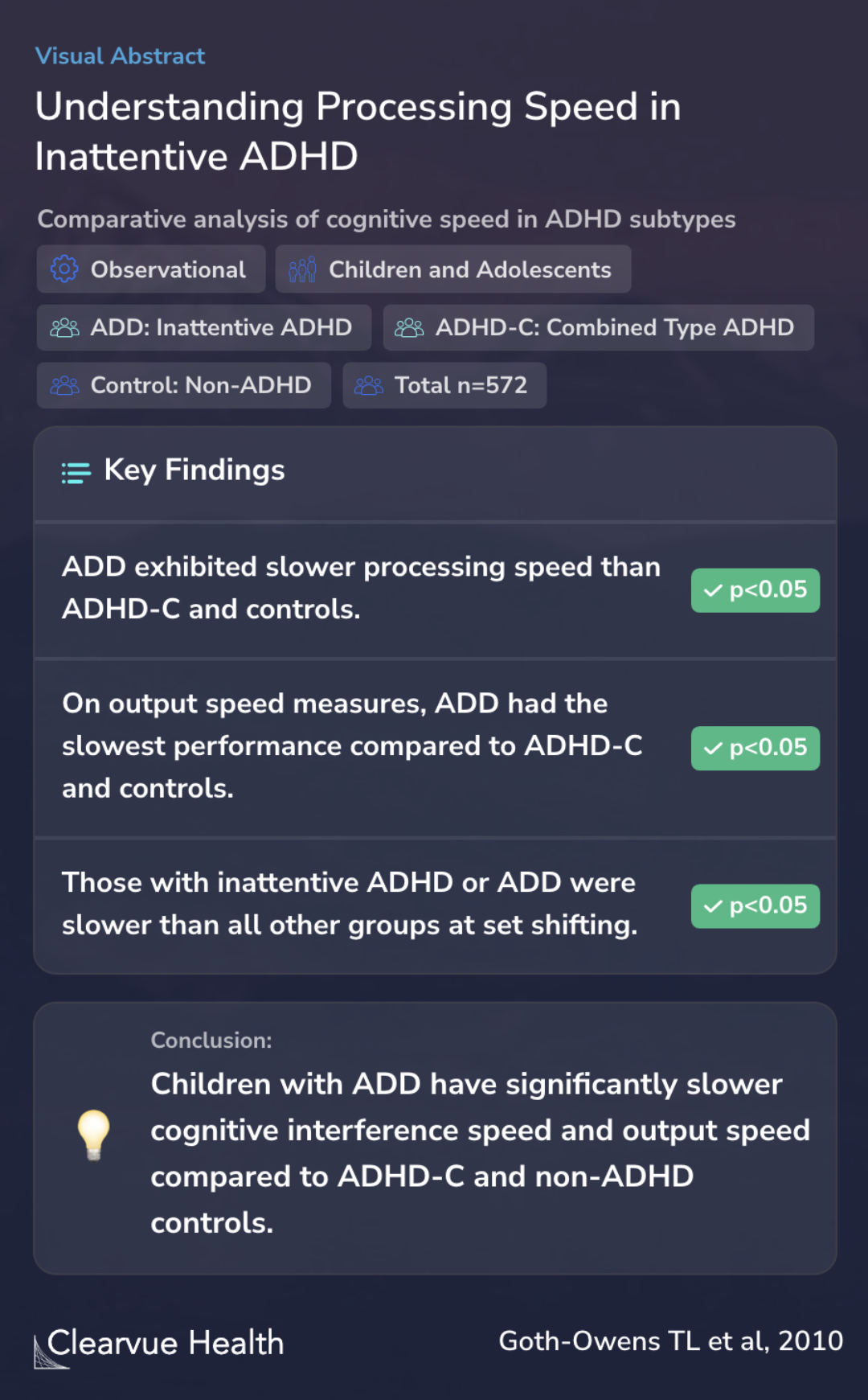Processing speed weakness in children and adolescents with non-hyperactive but inattentive ADHD (ADD)
Understanding Processing Speed in Inattentive ADHD
Goth-Owens TL, Martinez-Torteya C, Martel MM, Nigg JT

Objectives
The study delved into the speed of thought processes in children with primarily inattentive ADHD. ADHD manifests in different ways - some children are mainly hyperactive and impulsive, while others are more subdued but struggle with paying attention. There are also those who exhibit a mix of these symptoms. This research specifically aimed to understand the cognitive pace in children who primarily show inattention. The underlying concern is that ADHD might affect how quickly some children think, which could have broader implications beyond academic settings. For instance, it could mean that intelligence tests might not fully capture the true IQ of children with ADHD due to their slower test-taking speed.
DSM-IV-TR defines ADHD-Predominantly Inattentive as allowing up to five symptoms of hyperactivity/impulsivity, while theories of the inattentive type usually assume a group that is hypoactive and characterized by processing speed and cognitive interference deficits.
Methods
In this study, 572 children and adolescents were grouped based on their ADHD symptoms. The focus was on those who fit the criteria for the predominantly inattentive subtype of ADHD (ADD). These children had minimal hyperactive/impulsive symptoms. The study compared their processing and output speeds with those of children having ADHD of the combined type (ADHD-C) and a control group without ADHD. To assess these speeds, the researchers used the Trailmaking A and B tests and the Stroop Naming Tests. They also evaluated how well these children could control cognitive interference using the Stroop Task.
In a community-recruited sample of 572 children and adolescents, a pure inattentive subtype of ADHD (ADD) was defined as those who met DSM-IV-TR criteria for ADHD-PI but had two or fewer hyperactive/impulsive symptoms. Processing and output speeds of those with ADD were compared to those...
Results
The results indicated that children with ADD showed slower cognitive interference speeds than those with ADHD-C and the control group. This difference was more pronounced than in comparisons between ADHD-PI and ADHD-C or control groups. Additionally, when it came to output speed measures, the ADD group performed the slowest, significantly differing from the control group. The difference in speed for shifting between tasks (as measured by Trailmaking B) was notably larger in the ADD group than in the ADHD-PI vs. control comparison. These findings suggest that the inattentive form of ADHD, particularly in its pure state, can significantly impact a child's ability to process information quickly and respond accordingly.
Slower cognitive interference speed was found in the ADD vs. ADHD-C and controls comparisons, but not the ADHD-PI versus ADHD-C and controls comparisons. On output speed measures, ADD exhibited the slowest performance, significantly different from controls and the effect size for the set...
Conclusions
The study concludes that the inattentive type of ADHD, as defined by DSM-IV-TR, is a diverse condition. A substantial portion of affected individuals exhibit almost no hyperactive/impulsive symptoms. This subgroup might represent a distinct inattentive condition, characterized by slower processing speeds and difficulties in managing cognitive interference. These findings emphasize the importance of recognizing the different facets of ADHD, as they can uniquely impact academic performance and intelligence assessments.
ADHD-Inattentive type as defined by the DSM-IV-TR is a heterogeneous condition with a meaningful proportion of those affected exhibiting virtually no hyperactive/impulsive symptoms. This subgroup may represent a distinct inattentive condition characterized by poor cognitive interference ...
Key Takeaways
Context
The study aligns with previous research like that of Goodwin et al. (2011), which examined the link between ADHD symptoms and IQ test scores. They found that those taking longer to answer questions often scored lower, suggesting that IQ tests may underestimate intelligence in children with ADHD. The current study supports this by showing that children with inattentive ADHD can be slower in processing and responding, potentially affecting their test scores.
Further supporting this notion, Epstein et al. (2011) explored the variability in response times among children with ADHD. Their findings indicated that ADHD could lead to a wider range of response times in various cognitive tests. This reinforces the idea that ADHD, particularly the inattentive type, can slow down an intelligent student's responses, affecting their academic performance.